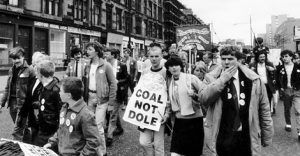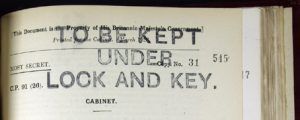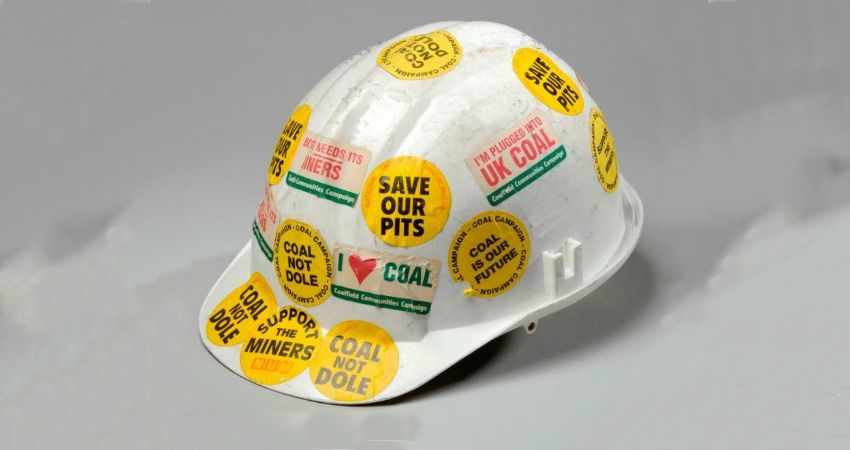
by Richie Venton, SSP national workplace organiser
The announcement by the Scottish government of an independent review of policing in Scotland during the year-long 1984/5 miners’ strike is immensely welcome to all who wish to stand up for the working class.
It’s a long overdue breakthrough for the victimised miners, their families, communities and political allies.
It’s testimony to the value of sustained campaigning, even when at first we don’t succeed!

It’s a chance for those who experienced the naked state violence – over 33 years ago – to tell their stories, reveal the frightening truth to a younger generation about the real nature of the state and the capitalist system of exploitation of workers which it props up… and make it that bit harder for future repetitions of this orchestrated terror campaign against communities and trade unionists in general.
Denied by Westminster
The battle for a full-blown public inquiry has been waged for years. At UK level, successive Tory and Labour governments rejected appeals for investigation into policing, and critically, the centralised, politicized nature of the police operations during the 12-month strike to save mining communities from utter devastation.

In 2016, the then Tory Home Secretary Amber Rudd turned from green to red! She first spoke of “giving the green light to a public inquiry”, especially into the crescendo of conscious brute police violence against strikers at the Orgreave coke depot, in Yorkshire, in June 1984. She then dismissed the demands for truth and justice with breathtaking arrogance, declaring “nobody died”. Not true!
If the mounted, paramilitary police atrocities against pickets in plimsoles and tee-shirts hadn’t happened at Orgreave, and hadn’t been systematically covered up and allowed to go unanswered, the very same police chiefs who organised the same cynical cover-up again at Hillsborough – eight miles away, five years later – might never have been at liberty to do so. And the Hillsborough 96 may never have lost their lives.
Hillsborough linked to Orgreave
The devastating revelations in the Hillsborough Inquiry, and the tenacity of those demanding an inquiry into the miners’ strike, made it increasingly difficult for the Scottish government, in particular, to resist.
In fact, under both Alex Salmond in 2013, and again under Nicola Sturgeon in 2016, the Scottish government did still spurn the growing clamour for a Scottish public inquiry. They tried to bat away responsibility for such an Inquiry to Westminster; not wrong in itself, but an abdication of the duty and opportunity to lead the way in Scotland itself, where miners suffered disproportionate levels of persecution.
Scotland’s Disproportionate Repression
The miners of Scotland constituted 10% of the UK-wide workforce. But 30% of all prosecutions were against Scottish miners. Five hundred of them suffered trials, sentences, fines, debarment from going near picket lines at their own workplace, and in many cases the sack – depriving them of even a redundancy package when the Tory government and Coal Board bosses had successfully deployed a nationally centralised police operation to help ram through pit closures.
When the widely-hated Maggie Thatcher died, taxpayers’ money was plundered to afford her a state funeral. In cruel contrast, many of the miners who were not only prosecuted and sacked, but also blacklisted and made unemployable the rest of their days, went to their graves with a dark stain on their character – for the ‘crime’ of standing up in defence of their families and communities against the calculated social and industrial vandalism of Thatcher’s government. Tory vandalism perpetrated on behalf of the parasitic banking wing of capitalists, who wanted a fast buck rather than a strong industrial economy, and wanted to eradicate the power of the organised unions to resist their slaughter of jobs and communities.
Limitations of this Review
So this Scottish government Independent Review, due to report by June 2019, is a welcome step forward compared to the hard-faced refusal of Westminster governments – Tory and Labour – to open up the truth to public scrutiny. And, indeed, compared to the refusal of an Inquiry by the SNP government in previous years.
It’s particularly encouraging that the Review will be conducted by renowned civil rights lawyer, John Scott QC, with the assistance of a team that includes former left-wing MSP Dennis Canavan.
However, I’m sure I’m not alone in being concerned and critical of the relatively narrow remit and terms of reference issued to the Review by the Holyrood government:
“To investigate and report on the impact of policing on affected communities in Scotland during the period of the miners’ strike from March 1984-March 1985.”
No Cover-up of Thatcher’s Role!
Former miners, older trade unionists and socialists who participated in 1984-5, and families of those who suffered the state repression, should now make the most of the opportunity to add their voices to the documents which the Review will research.
But there’s a serious danger that by setting up an independent review, rather than a full-blown public inquiry, the pernicious role of Thatcher and her government may not be adequately exposed, if at all. Yet that issue is at the very heart of the struggle for truth and justice, 33 years on.
As I wrote in 2016, in arguing the case for a Scottish Public Inquiry, as demanded in the Online Petition I lodged on behalf of the SSP at the time:

“Secret government documents, published recently under the 30-year Rule, confirm what many of us knew 30 years ago!
One document records a meeting in 10 Downing St including Prime Minister Margaret Thatcher, Home Secretary Leon Brittan and Attorney General Sir Michael Havers – just after Orgreave – which “invited the Home Secretary, consulting the Lord Chancellor and Attorney General, to pursue vigorously all possible means of accelerating the prosecution of alleged offences.”
The same cabal met two weeks later, where “Brittan (backed by Thatcher) promised he would seek to persuade the police to increase the rate of prosecution” of pickets. Proof – of the blatant political control of policing operations, and ruthless persecution of trade unionists who dared to defy their class war and economic vandalism.”
Expose Tory Coordination of State Violence
The Review is a warmly welcome breakthrough in the ongoing struggle for truth and justice. It is also a weapon in the campaign to force Westminster into holding a statutory Public Inquiry into Orgreave and the role of the government at UK level in their class war on miners and the wider working class.
But we must be vigilant and not allow it to only focus on localized policing operations, and smooth over the cold, calculated, class cruelty of the Thatcher government – whose hands were all over policing decisions, when they instructed police chiefs to “vigorously pursue all possible means” of smashing the National Union of Mineworkers, the miners, their families and communities, and socialist forces who stood steadfastly on their side against the employing class and their state.
The Outcome of 1985 Shapes Our World Today
A few begrudgers on social media denounced news of the Review with snide comments about its cost, and its relevance compared to current issues. Firstly, what price justice? Secondly, it’s no exaggeration to say the defeat of the miners – with the aid of police violence, secret service infiltration, vitriolic media lies, and use of the benefits system to starve strikers’ children and families into submission – that defeat of one of the most heroic sections of the working class has shaped and defined the conditions we face today.
It was a turning point in modern history, weakening the unions, imposing vicious anti-union laws, leaving whole communities as deserts of social desolation and drug abuse, and laid the foundations for the low-wage, casualised jobs that blight Scotland in 2018.
We need to learn, relearn, and expose the lessons of that titanic struggle. We also need to introduce young people to the marvellous, inspirational traditions of the miners. And we need to use the Review as a platform to demand more, including a UK-wide public inquiry to reveal the methods of the political, industrial and military arms of the ruling elite during 1984-5… to make us all the more aware and prepared for such methods in struggles against poverty, inequality and their capitalist roots in years to come.
This Review is a huge breakthrough: now for truth and justice!

